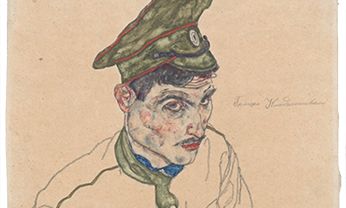The Art Institute of Chicago acquired Egon Schiele’s Russian War Prisoner in 1966
Manhattan District Attorney’s Office
In the legal battles over who should rightly own Egon Schiele’s 1916 work on paper Russian War Prisoner, the Art Institute of Chicago (AIC), which acquired it in 1966, scored a victory with the 28 February dismissal of a civil action to claim the painting brought by heirs of Fritz Grünbaum, the Jewish Austrian collector whose art was confiscated by the Nazis while he was sent to his death in a concentration camp. Another battle looms, as the New York City District Attorney’s office has also sought to remove the work and return it to those heirs, with oral arguments expected to take place in the New York Supreme Court in late April or early May.
The civil lawsuit was heard in a federal court, with Judge John G. Koeltl ruling that the statute of limitations for heirs to have brought the claims had expired and that the museum had not purchased the work in bad faith—that is, knowing that it had been looted. Megan Michienzi, a spokesperson for the AIC, said after the ruling that “we have always acted in good faith. If we had this work unlawfully, we would return it, but that is not the case here, as is made clear in the latest federal court ruling”.
Raymond Dowd, a lawyer for Grünbaum’s heirs, disputes Michienzi’s reading of the ruling, claiming that “good-faith possession is not the same as owning good title. Under New York law, the painting still remains stolen property.” He claims that Judge Koeltl made no finding as to whether or not Russian War Prisoner was war loot, adding: “Our case was dismissed on timeliness grounds.”
The criminal case is proceeding. Last summer, the Manhattan District Attorney’s Office took possession of the work, although it has remained at the AIC awaiting a ruling on whether it should be restituted to Grünbaum’s heirs, Timothy Reif, David Fraenkel and Milos Vavra.
On 22 February, Matthew Bogdanos, a senior trial counsel in the Office of the District Attorney of New York County and chief of the Antiquities Trafficking Unit, laid out a 160-page petition to the New York State Supreme Court, claiming that Grünbaum’s art collection, particularly his 80-plus works by Schiele, “were systematically stolen from Grünbaum after he was imprisoned in the Dachau Concentration Camp for the crime of being Jewish and then sold”.
The museum is expected to offer its response to the charges on 23 April.

